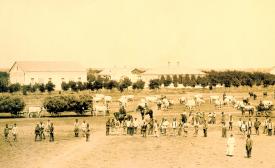From power to pathos

The Brodsky estate of Peter and Marie Bahnmann. (Photo from The Russian Mennonite Story: The Heritage Cruise Lectures. www.therussianmennonitestory.com)


The Brodsky estate of Peter and Marie Bahnmann. (Photo from The Russian Mennonite Story: The Heritage Cruise Lectures. www.therussianmennonitestory.com)

Meghan Florian’s name surfaced in the small circle of Mennonite pastors and friends I know in the United States. Because this is how I found this book, I assumed it would be a “churchy” (or religious, or theological, or spiritual) collection of essays. What I found was a case for better writing in the church.
A widely published poet, a retired professor, a farmer, a recent graduate and an engineer regularly discuss literature and theology together. Hard to imagine? The sight is more likely than you might think.
At the age of 85, I am probably one of the few survivors of the German occupation of Ukraine/Russia from 1941 to 1943 who still have clear personal memories of that time.
Life at the End of Us Versus Them is an unconventional critique of the postmodern world from the perspective of a youngish father who lives off the land. Part theologian, part philosopher, Marcus Rempel examines contemporary culture from the perspective of someone who takes the message of Jesus seriously.
Some years ago, in the book The Body and the Blood, reporter Charles Sennott of the Boston Globe lamented the Middle East’s vanishing Christian population, many leaving because of the bitter conflicts there. They were needed, Sennott argued, because they represented a mediating force, even those not committed to pacifism.
Nobody knows the trouble I’ve seen / Nobody knows my sorrow / Nobody knows the trouble I’ve seen / Nobody knows but Jesus
By entitling his book with the words of the African-American spiritual, one known by whites through popularization in modern entertainment, Drew Hart puts his thesis front and centre.
Poetry has always spoken to me. Whether it is the blank verse of Shakespeare, the doubling images of Hebrew scripture, or the lyrics of song, popular or otherwise. But I had not found the time for regular reading and contemplation until a spiritual director on an eight-day silent retreat suggested that my spiritual path sounded to her to echo the 14th-century Sufi poet Hafez.
In the 1940s, Mary Emma Showalter began a cookbook project, collecting old Mennonite recipes that were handwritten in notebooks because she feared that soon the notebooks would be discarded. As Mennonites began moving beyond their home communities during the Second World War, they were learning to cook new foods and were less apt to use the old recipes learned from home.
John Siebert had two things to say to Carrie Snyder as she finished her readings from her latest book, Girl Runner, at Conrad Grebel University College on March 4.
Spurred by requests from his thoroughly modern children to tell them stories of his growing-up years in the Ontario Swiss Mennonite homeland of Waterloo County, Maurice Martin, a retired pastor and area church worker, wrote One Mile East of Edensville and self-published it in 2013. His home on the farm was “the centre of innocence,” as he remembers it.